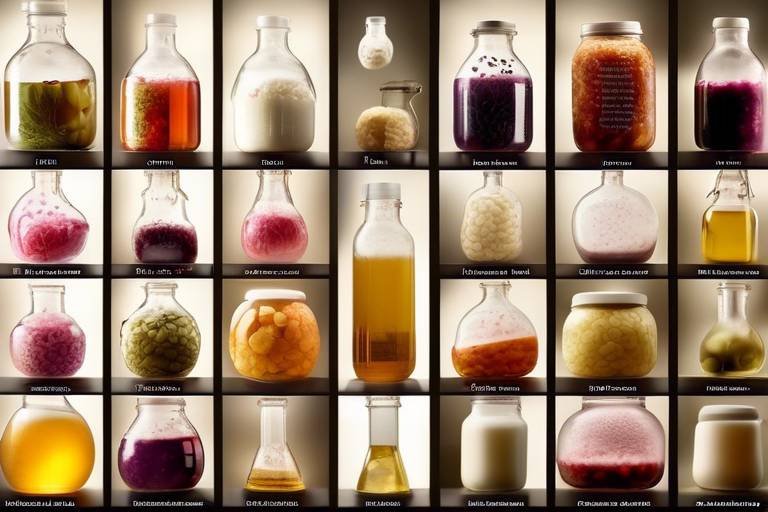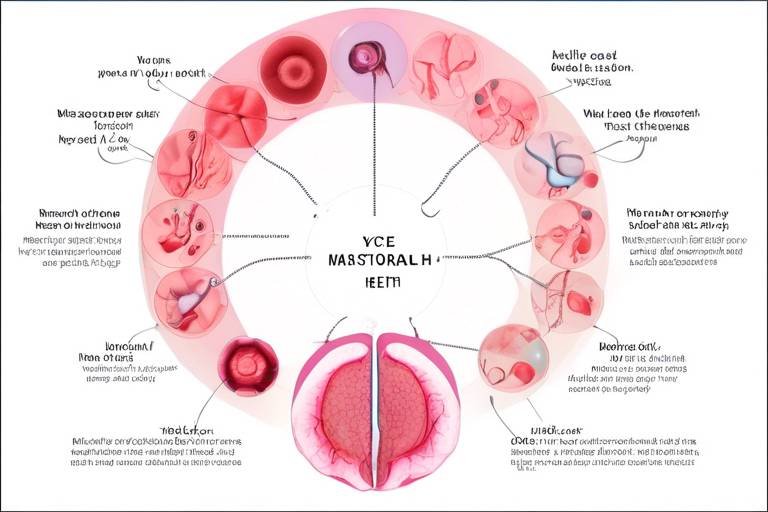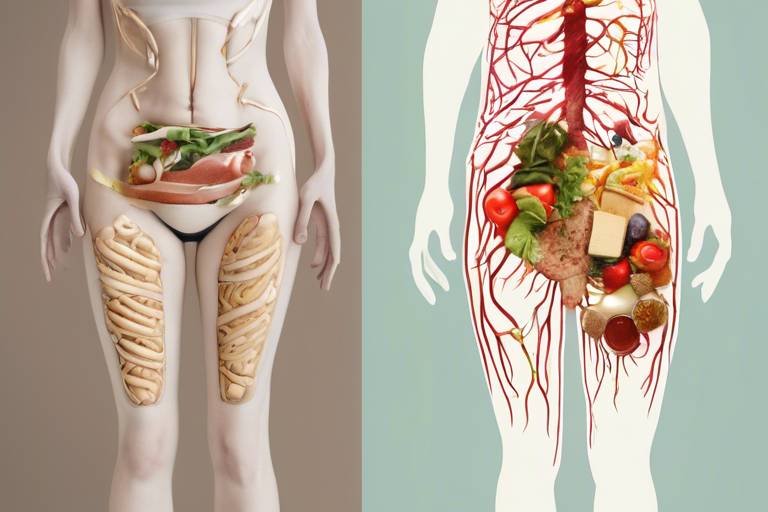The Role of Folic Acid in Daily Nutrition - What to Know
Folic acid, also known as vitamin B9, has emerged as a key player in our daily nutrition, and understanding its significance is crucial for maintaining optimal health. This water-soluble vitamin is not just a nutrient; it’s a powerhouse that supports various bodily functions, particularly in the synthesis and repair of DNA. Imagine your body as a complex machine; folic acid acts like the oil that keeps everything running smoothly. Without it, the machine can start to grind to a halt, leading to various health issues.
In our fast-paced world, many people overlook the importance of folic acid, often prioritizing other vitamins while neglecting this essential nutrient. But here’s the kicker: folic acid is especially vital for certain groups, including pregnant women, the elderly, and those with specific health conditions. It’s like that unsung hero in a movie that everyone depends on but rarely gets the credit they deserve. By the end of this article, you’ll have a comprehensive understanding of folic acid, its benefits, recommended intake, and the potential consequences of deficiency.
Folic acid is a synthetic form of folate, which is naturally found in various foods. Understanding its chemical structure is essential to appreciate its biological functions. Folate is involved in numerous processes, including the formation of red blood cells and the maintenance of healthy cells. It plays a pivotal role in the production of DNA and RNA, which are crucial for cell division and growth. Think of folic acid as the essential building block that helps your body create new cells, particularly during periods of rapid growth such as pregnancy and adolescence.
The health benefits of folic acid are numerous and varied. Research has linked adequate folic acid intake to improved brain function, enhanced heart health, and a reduced risk of certain diseases. It’s like having a multi-tool in your nutritional toolbox; with a little folic acid, you can tackle a range of health concerns. For instance, studies suggest that folic acid may help lower levels of homocysteine, an amino acid that, when elevated, can increase the risk of heart disease. Additionally, it’s believed that folic acid can support mental health, potentially reducing the risk of depression and cognitive decline.
When it comes to pregnancy, folic acid is absolutely vital. It plays a crucial role in fetal development and significantly reduces the risk of neural tube defects, which can affect the brain and spinal cord. Expectant mothers are often advised to take folic acid supplements to ensure they meet their increased nutritional needs. Think of folic acid as a protective shield for your growing baby, providing the necessary nutrients for healthy development.
Health organizations recommend that pregnant women consume at least 600 micrograms of folic acid daily. This dosage is crucial for optimal health outcomes for both mother and baby. It’s essential to follow these guidelines to ensure that both parties are getting the nutrients they need. However, it’s always a good idea to consult with a healthcare provider for personalized recommendations.
Pregnant women can obtain folic acid from a variety of dietary sources. Foods rich in folate include:
- Leafy green vegetables (like spinach and kale)
- Citrus fruits (oranges and grapefruits)
- Beans and legumes (lentils and chickpeas)
- Fortified cereals and grains
Incorporating these foods into daily meals can significantly enhance folic acid intake, ensuring a balanced diet during pregnancy.
A deficiency in folic acid can lead to serious health issues, such as anemia and developmental problems. Symptoms of deficiency may include fatigue, weakness, and irritability. In the long term, inadequate folic acid intake can result in complications like neural tube defects during pregnancy and even cognitive impairments in adults. It’s like driving a car with a low fuel gauge; eventually, you’ll come to a stop if you don’t fill up. Therefore, understanding the signs of deficiency is crucial for timely intervention.
For adults, the daily recommended intake of folic acid is approximately 400 micrograms. This amount can vary based on age, sex, and health conditions. It’s essential to recognize that different life stages may require different amounts of this vital nutrient. For example, older adults may need slightly more to support their health, while individuals with certain medical conditions might require higher doses. Keeping track of your intake can help you maintain optimal health.
Understanding the folic acid needs of different age groups is vital. Here’s a quick breakdown:
| Age Group | Recommended Daily Intake |
|---|---|
| Children (1-3 years) | 150 micrograms |
| Children (4-8 years) | 200 micrograms |
| Adults | 400 micrograms |
| Pregnant Women | 600 micrograms |
| Lactating Women | 500 micrograms |
By understanding these variations, individuals can better tailor their diets to meet their nutritional needs.
For those who struggle to meet their folic acid needs through diet alone, supplements can be a beneficial option. Folic acid supplements come in various forms, including tablets and gummies, making it easier to incorporate into daily routines. However, it’s essential to consider safe usage and consult with a healthcare provider before starting any supplementation. After all, too much of a good thing can sometimes lead to adverse effects!
Q: What are the symptoms of folic acid deficiency?
A: Symptoms may include fatigue, weakness, irritability, and in severe cases, anemia.
Q: Can I get enough folic acid from my diet?
A: Yes, by consuming a balanced diet rich in leafy greens, legumes, and fortified foods.
Q: Is it safe to take folic acid supplements?
A: Generally, yes, but it’s best to consult with a healthcare provider for personalized advice.

What is Folic Acid?
Folic acid, also known as vitamin B9, is a water-soluble vitamin that plays a pivotal role in numerous bodily functions. It is essential for the synthesis and repair of DNA, which is crucial for cell division and growth. Think of folic acid as the unsung hero of your body—working diligently behind the scenes to ensure everything runs smoothly. Without adequate folic acid, our cells cannot function optimally, which can lead to a cascade of health issues.
Folic acid is particularly important during periods of rapid growth, such as during pregnancy and infancy. The body requires this vitamin to produce healthy red blood cells, which are vital for transporting oxygen throughout the body. If you were to picture your body as a bustling city, folic acid would be the construction worker, tirelessly building and repairing the infrastructure that keeps everything in order.
In its natural form, folic acid is known as folate, and it is found in various foods. Some of the richest sources of folate include:
- Leafy green vegetables (like spinach and kale)
- Legumes (such as lentils and chickpeas)
- Fruits (especially citrus fruits)
- Nuts and seeds
- Whole grains
Despite its availability in food, many people do not consume enough folate, which is where folic acid supplements come into play. These supplements are often recommended to ensure that individuals meet their daily requirements, particularly for those who may be at risk of deficiency. In essence, folic acid is a critical component of our daily nutrition, and understanding its role is key to maintaining our health.
Moreover, the chemical structure of folic acid comprises a pteridine ring, para-aminobenzoic acid, and glutamic acid. This unique structure enables folic acid to participate in various biochemical reactions, making it indispensable for our metabolic processes. Without it, our bodies would struggle to perform essential functions, leading to a range of health complications.
In summary, folic acid is more than just a vitamin; it is a fundamental nutrient that supports numerous physiological processes. By incorporating folate-rich foods into your diet or considering supplementation, you can help ensure your body has the necessary tools to thrive and maintain optimal health.

Health Benefits of Folic Acid
Folic acid, also known as vitamin B9, is not just another nutrient; it’s a powerhouse that plays a significant role in our overall health. Imagine it as a key player in the orchestra of our body, ensuring that everything harmonizes perfectly. From supporting cellular functions to enhancing our mental clarity, folic acid is essential for maintaining a balanced and healthy life. But what exactly makes it so special? Let's dive into the myriad of health benefits that adequate folic acid intake can provide.
One of the most remarkable benefits of folic acid is its ability to improve brain function. Research has shown that a sufficient intake of folate is linked to better cognitive abilities and a lower risk of cognitive decline as we age. It's like giving your brain a tune-up; it helps keep your mind sharp and your thoughts clear. Additionally, folic acid is known to play a role in the production of neurotransmitters, which are the chemicals that transmit signals in the brain. This means that not only can it help you think more clearly, but it can also help elevate your mood.
Another significant benefit of folic acid is its impact on heart health. It has been observed that folate can help lower levels of homocysteine, an amino acid that, in elevated amounts, is linked to an increased risk of heart disease. By keeping homocysteine levels in check, folic acid acts like a protective shield for your heart, helping to reduce the risk of cardiovascular issues. So, if you're looking to maintain a healthy heart, ensuring you get enough folic acid could be a crucial step.
Furthermore, folic acid is essential in reducing the risk of certain diseases. Studies have suggested that adequate folate intake may be associated with a lower risk of certain cancers, including colorectal cancer. It’s believed that folic acid helps in DNA synthesis and repair, which is vital in preventing mutations that could lead to cancer. Think of it as a bodyguard for your cells, helping to keep them safe from potential threats.
To sum it up, the health benefits of folic acid are numerous and impactful. Here’s a quick recap of what folic acid can do for you:
- Boosts brain health and cognitive function
- Supports heart health by lowering homocysteine levels
- Reduces the risk of certain cancers through DNA repair
- Essential for fetal development during pregnancy
Incorporating folic acid into your daily diet can be as simple as eating a variety of foods rich in this vital nutrient. Leafy greens, legumes, nuts, and fortified cereals are excellent sources to consider. So, whether you’re looking to boost your brainpower or protect your heart, ensuring you have enough folic acid in your diet is a smart move for your overall health.
Q: How much folic acid do I need daily?
A: The recommended daily intake varies by age and gender, but for most adults, it's about 400 micrograms. Pregnant women should aim for 600 micrograms.
Q: Can I get enough folic acid from my diet?
A: Yes! Eating a balanced diet with plenty of fruits, vegetables, legumes, and fortified grains can help you meet your folic acid needs.
Q: Are there any side effects of taking folic acid supplements?
A: Generally, folic acid is safe, but excessive intake from supplements can mask symptoms of vitamin B12 deficiency. It's always best to consult with a healthcare provider before starting any new supplement.

Folic Acid and Pregnancy
When it comes to pregnancy, folic acid is nothing short of a superhero nutrient. This powerful B vitamin is essential for the healthy development of a fetus, especially during the early stages of pregnancy. Why is it so crucial, you ask? Well, folic acid plays a vital role in the formation of the neural tube, which eventually develops into the brain and spinal cord. Insufficient folic acid during this critical period can lead to serious birth defects, known as neural tube defects (NTDs), which can affect the brain and spine. Imagine the impact of a strong foundation on a building; similarly, folic acid provides the groundwork for a healthy pregnancy.
But how much folic acid do pregnant women actually need? The recommended dosage is typically around 600 micrograms (mcg) per day, which is a slight increase from the 400 mcg recommended for women who are not pregnant. This increase is necessary to support the growing needs of the developing baby. It's a bit like upgrading your car's engine to handle a heavier load; the extra folic acid ensures that the body can keep up with the demands of pregnancy.
For expectant mothers, supplementation is often recommended, especially in the first trimester when the risk of NTDs is highest. However, it’s not just about popping a pill. A balanced diet rich in folate can also contribute significantly to meeting these needs. Foods like leafy greens, beans, citrus fruits, and fortified cereals are excellent sources of folate. Think of it as building a robust toolbox; a variety of food sources can equip you with the nutrients necessary for a healthy pregnancy.
In summary, ensuring adequate folic acid intake during pregnancy is not merely a suggestion but a crucial step towards safeguarding both maternal and fetal health. By understanding the importance of this vitamin, pregnant women can take proactive measures to ensure they provide the best environment for their developing baby.
- What happens if I don't get enough folic acid during pregnancy? Insufficient folic acid can lead to serious complications, including neural tube defects and other developmental issues.
- Can I get enough folic acid from my diet alone? While a balanced diet can provide some folic acid, many healthcare providers recommend supplements to ensure adequate intake during pregnancy.
- When should I start taking folic acid? It's advisable to start taking folic acid at least one month before conception and continue through the first trimester.

Recommended Dosage for Pregnant Women
When it comes to ensuring a healthy pregnancy, the right intake of folic acid is non-negotiable. Health organizations, including the Centers for Disease Control and Prevention (CDC) and the American College of Obstetricians and Gynecologists (ACOG), recommend that pregnant women consume a daily dose of 600 micrograms (mcg) of folate or folic acid. This amount is crucial for supporting the rapid cell division and growth that occurs during pregnancy.
But why is this dosage so important? Well, adequate folic acid intake significantly reduces the risk of serious birth defects of the brain and spine, known as neural tube defects. Think of folic acid as a protective shield for your baby's developing nervous system. It’s like putting on a seatbelt before a ride—essential for safety!
It's also worth noting that women who are planning to conceive are advised to start taking folic acid supplements at least one month before conception and continue through the first trimester. This proactive approach can help set the stage for a healthy pregnancy. The recommended dosage during this preconception period is typically 400 mcg daily, which can be easily obtained through supplements or fortified foods.
To help visualize the importance of folic acid, here's a quick breakdown:
| Stage of Pregnancy | Recommended Dosage |
|---|---|
| Preconception | 400 mcg daily |
| First Trimester | 600 mcg daily |
| Second Trimester | 600 mcg daily |
| Third Trimester | 600 mcg daily |
In addition to supplements, pregnant women should focus on incorporating folate-rich foods into their diets. Foods such as leafy greens, legumes, nuts, and fortified cereals can help meet these daily requirements. It's like building a nutritious fortress around your baby—every bite counts!
However, it’s essential for pregnant women to consult with their healthcare providers before starting any new supplement regimen. Each pregnancy is unique, and a healthcare professional can provide personalized recommendations based on individual health needs. After all, when it comes to your health and your baby's health, a tailored approach is always best!

Sources of Folic Acid for Pregnant Women
When it comes to ensuring a healthy pregnancy, folic acid is one of those superheroes you want to have on your side. It's not just about taking a supplement; it's also about incorporating folate-rich foods into your daily diet. Folic acid is the synthetic form of folate, which naturally occurs in many foods. So, what are some of the best sources of folate that pregnant women should consider? Let’s dive in!
First off, leafy greens are your best friends. Think spinach, kale, and romaine lettuce. These vibrant greens are packed with folate and can easily be tossed into salads or smoothies. But don’t stop there! Legumes like lentils, chickpeas, and black beans are also fantastic sources. A single cup of cooked lentils can provide up to 90% of your daily folate needs. Now that’s what I call a power-packed meal!
Moreover, you can’t overlook the importance of fruits. Citrus fruits, such as oranges and grapefruits, not only keep you hydrated but are also rich in folate. Avocados are another great choice; they’re creamy, delicious, and loaded with nutrients. Berries, especially strawberries and raspberries, are not just tasty but also contribute to your folate intake.
Additionally, fortified foods can be a game-changer. Many breakfast cereals and grains are fortified with folic acid, making it easier to meet your daily requirements. Just look for labels that specify “fortified with folic acid.” However, it’s essential to balance these with whole foods to ensure you’re getting a wide range of nutrients.
To summarize, here’s a quick list of some excellent sources of folate for pregnant women:
- Leafy greens (spinach, kale, romaine lettuce)
- Legumes (lentils, chickpeas, black beans)
- Citrus fruits (oranges, grapefruits)
- Avocados
- Berries (strawberries, raspberries)
- Fortified cereals and grains
Incorporating these foods into your diet can not only help you meet your folate needs but also make your meals more exciting and nutritious. Remember, a balanced diet is key during pregnancy, and focusing on these folate-rich foods can significantly contribute to the health of both you and your baby. So, next time you plan your meals, think of these vibrant, folate-rich foods as essential building blocks for a healthy pregnancy!
1. How much folic acid do I need during pregnancy?
The recommended daily intake of folic acid for pregnant women is 600 micrograms. However, it's best to consult with your healthcare provider for personalized advice.
2. Can I get enough folic acid from food alone?
While many foods are rich in folate, some women may still require supplements to meet their daily needs, especially if they have dietary restrictions.
3. Are there any risks associated with too much folic acid?
Excessive intake of folic acid from supplements can mask vitamin B12 deficiency and lead to neurological issues. Always stick to recommended dosages.
4. How can I ensure I'm getting enough folic acid?
Incorporate a variety of folate-rich foods into your diet, consider fortified foods, and consult with a healthcare provider about supplements if necessary.

Consequences of Folic Acid Deficiency
When we think about nutrition, it's easy to overlook the importance of certain vitamins, especially folic acid. This B vitamin is more than just a nutrient; it's a powerhouse that plays a crucial role in our body's functions. A deficiency in folic acid can lead to a range of serious health issues that can affect not only our physical well-being but also our mental health. Imagine your body as a finely-tuned machine; without the right fuel, it can sputter and stall. That's what happens when we don't get enough folic acid.
One of the most common consequences of folic acid deficiency is anemia. This condition occurs when your body lacks enough healthy red blood cells to carry adequate oxygen to your tissues. Symptoms can include fatigue, weakness, and pale skin. It's like trying to run a marathon with a flat tire; you just can't go the distance. Additionally, folic acid is essential for DNA synthesis and repair. Without it, our cells can’t replicate properly, which may lead to developmental problems, especially in children and during pregnancy.
But that's not all. A lack of folic acid can also lead to significant neurological issues. Research has shown that folic acid plays a role in cognitive functions. Individuals with low levels of this vitamin may experience symptoms like forgetfulness, confusion, and even depression. It's as if your brain is trying to function on low battery power—eventually, it will shut down.
Here’s a quick look at some potential consequences of folic acid deficiency:
- Anemia: Fatigue, weakness, and pale skin.
- Neurological Issues: Cognitive decline, forgetfulness, and mood disorders.
- Developmental Problems: Increased risk of neural tube defects in fetuses during pregnancy.
- Cardiovascular Issues: Elevated homocysteine levels, which can lead to heart disease.
In severe cases, prolonged folic acid deficiency can lead to more serious conditions, such as heart disease due to elevated homocysteine levels. Homocysteine is an amino acid that, when elevated, can damage blood vessels and lead to heart problems. Think of it as a traffic jam in your arteries; if things aren't flowing smoothly, you're bound to run into trouble.
In summary, the consequences of folic acid deficiency are multifaceted and can impact various aspects of health. From anemia to neurological issues, the ripple effects of not getting enough folic acid can be profound. It's crucial to recognize the signs and symptoms early on, so you can take action to improve your diet or consider supplementation. After all, maintaining optimal health is a journey, and every nutrient plays a part in that adventure.
1. What are the signs of folic acid deficiency?
Common signs include fatigue, weakness, pale skin, forgetfulness, and mood changes. If you notice these symptoms, it's a good idea to consult with a healthcare provider.
2. How much folic acid do I need daily?
The recommended daily allowance varies: adults typically need about 400 micrograms, while pregnant women should aim for 600 micrograms to support fetal development.
3. Can I get enough folic acid from my diet?
Yes, many foods are rich in folate, such as leafy greens, legumes, and fortified cereals. However, if you're concerned about your intake, supplements can also be beneficial.
4. Are there any risks associated with too much folic acid?
While folic acid is generally safe, excessive intake from supplements can mask vitamin B12 deficiency, leading to neurological issues. Always consult with a healthcare provider before starting any new supplement regimen.

Daily Recommended Intake for Adults
Understanding the daily recommended intake of folic acid for adults is crucial for maintaining optimal health. The general guideline suggests that adults should aim for a daily intake of about 400 micrograms (mcg) of folate, which is the natural form of folic acid found in foods. This amount is vital for various bodily functions, including DNA synthesis, cell division, and overall cellular health. However, it’s important to note that individual needs may vary based on factors such as age, sex, and specific health conditions.
For instance, men and women have similar requirements, but women who are planning to become pregnant or are currently pregnant are advised to increase their intake to about 600 mcg. This increase helps support fetal development and significantly reduces the risk of neural tube defects. It’s fascinating how a simple vitamin can play such a monumental role in life and health!
To give you a clearer picture, let’s take a look at the recommended folic acid intake across different adult age groups:
| Age Group | Recommended Intake (mcg) |
|---|---|
| Adults (19 years and older) | 400 mcg |
| Pregnant Women | 600 mcg |
| Lactating Women | 500 mcg |
It’s essential to understand that while folic acid is readily available in various foods, many adults may not be getting enough through their diet alone. This is where supplements can come into play. For those who find it challenging to meet their folate needs through food, folic acid supplements are an effective alternative. However, it's wise to consult with a healthcare provider before starting any supplement regimen, as they can help tailor the intake to your specific health needs.
In addition to dietary sources and supplements, it's crucial to be aware of the factors that might increase your folic acid requirements. For example, individuals with certain health conditions, such as malabsorption disorders, or those undergoing specific medical treatments may need to adjust their intake. Regular check-ups and blood tests can help monitor folate levels and ensure you're on track with your nutritional needs.
In summary, maintaining the right levels of folic acid is a small but powerful step towards achieving better health. Whether through a balanced diet rich in leafy greens, legumes, and fortified foods, or through appropriate supplementation, ensuring adequate folate intake can lead to a healthier, more vibrant life.

Folic Acid for Different Age Groups
When it comes to folic acid, understanding the specific needs of different age groups is crucial for ensuring optimal health. Folic acid, also known as vitamin B9, is not just a one-size-fits-all nutrient. Each stage of life presents unique challenges and requirements, making it essential to tailor folic acid intake accordingly. For instance, children, adults, and seniors all have different nutritional needs that can significantly impact their overall well-being.
For children, folic acid plays a vital role in supporting growth and development. During these formative years, the body is rapidly developing, and adequate folic acid is necessary for proper cell division and DNA synthesis. The recommended daily allowance (RDA) for children varies by age:
| Age Group | Recommended Daily Intake (mcg) |
|---|---|
| 1-3 years | 150 mcg |
| 4-8 years | 200 mcg |
| 9-13 years | 300 mcg |
As children transition into adolescence, their bodies undergo significant changes, including growth spurts and hormonal shifts. During this time, the need for folic acid increases, particularly for girls who may become pregnant. For teenagers, the RDA is set at 400 mcg, ensuring they have enough folate to support both their own development and any future pregnancies.
For adults, the RDA for folic acid remains at 400 mcg, with a slight increase for women who are pregnant or planning to conceive. This is because folic acid is critical in preventing neural tube defects in developing fetuses. It’s a bit like laying down a solid foundation before building a house; without it, the structure may be compromised.
Now, let’s not forget about our beloved seniors. As we age, our bodies may absorb nutrients less efficiently, which can lead to deficiencies. The RDA for adults over 50 is slightly higher, at 400 mcg, particularly due to the increased risk of certain health conditions like heart disease and cognitive decline. Ensuring adequate folic acid intake can help mitigate these risks and promote better health outcomes.
In summary, while the need for folic acid is universal, the specific requirements can vary significantly across different age groups. Paying attention to these nuances can make a world of difference in maintaining optimal health. So, whether you’re a parent ensuring your child gets enough folate or a senior looking to boost your nutrition, understanding your folic acid needs is a step in the right direction.
- What is the best source of folic acid? Folic acid can be found in leafy green vegetables, fruits, beans, and fortified cereals.
- Can I get enough folic acid from my diet alone? While it's possible, many people may require supplements, especially pregnant women or those with certain health conditions.
- What are the symptoms of folic acid deficiency? Symptoms can include fatigue, weakness, irritability, and in severe cases, anemia.

Folic Acid Supplements
For many individuals, ensuring an adequate intake of folic acid through diet alone can be quite challenging. This is especially true for those with dietary restrictions or specific health conditions that may hinder nutrient absorption. In such cases, can serve as a reliable alternative to boost your daily intake. But before you rush to the nearest pharmacy, it's crucial to understand the different types of supplements available and the best practices for their use.
Folic acid supplements typically come in various forms, including tablets, capsules, and even liquid solutions. The most common type is the synthetic version of folate, known as folic acid, which is often found in multivitamins or standalone supplements. It's important to note that while folic acid is effective, some people prefer to take methylfolate, which is a more bioactive form of folate that the body can utilize more readily. This can be particularly beneficial for individuals with certain genetic mutations, such as the MTHFR mutation, which affects folate metabolism.
When considering folic acid supplements, dosage is a key factor. The recommended daily allowance (RDA) for folic acid varies based on age, gender, and specific life stages, such as pregnancy. For most adults, the RDA is about 400 micrograms (mcg), but pregnant women are often advised to increase their intake to 600 mcg to support fetal development. It's essential to consult with a healthcare provider to determine the appropriate dosage for your individual needs, as excessive intake can lead to complications, including masking vitamin B12 deficiency.
One of the significant advantages of folic acid supplements is their convenience. For those who find it difficult to consume enough folate-rich foods—like leafy greens, legumes, and fortified cereals—supplements can fill the gap. However, it's important to remember that supplements should not replace a balanced diet. Instead, they should be viewed as a complement to healthy eating habits.
Additionally, it's wise to be cautious about where you source your supplements. Not all products are created equal, and quality can vary significantly between brands. Look for supplements that have been third-party tested for purity and potency. This ensures that you're getting a product that meets high safety standards and contains the amount of folic acid stated on the label.
Lastly, while folic acid supplements can be beneficial, they are not a one-size-fits-all solution. Some individuals may experience side effects, such as gastrointestinal discomfort, when taking these supplements. If you notice any adverse reactions, it's crucial to consult with a healthcare professional to discuss alternative options or adjustments to your dosage.
- Can I get enough folic acid from food alone?
Yes, many people can obtain sufficient folic acid through a balanced diet rich in fruits, vegetables, legumes, and fortified grains. However, certain populations may require supplements. - Are there any side effects of taking folic acid supplements?
Some individuals may experience mild side effects, such as nausea or bloating. If you encounter any severe reactions, consult your healthcare provider. - Is it safe to take folic acid during pregnancy?
Absolutely! In fact, it's highly recommended for pregnant women to take folic acid supplements to support fetal development and reduce the risk of neural tube defects. - How can I choose a quality folic acid supplement?
Look for products that are third-party tested and check for certifications from reputable organizations to ensure quality and safety.
Frequently Asked Questions
- What is the difference between folic acid and folate?
Folic acid is the synthetic form of vitamin B9, while folate is the natural form found in foods. Think of folate as the friendlier, more natural version that your body loves to absorb from leafy greens, beans, and citrus fruits, while folic acid is like the supplement that helps fill in the gaps when your diet might be lacking.
- Why is folic acid important for pregnant women?
Folic acid is crucial during pregnancy because it helps prevent neural tube defects in the developing fetus. Imagine it as a safety net, catching potential issues before they can affect the baby’s development. This is why healthcare providers often recommend that pregnant women take a folic acid supplement to ensure they’re getting enough.
- How much folic acid should I take daily?
The recommended daily intake of folic acid varies by age and life stage. For most adults, it's about 400 micrograms, but pregnant women should aim for 600 micrograms. It’s like tuning a guitar; just the right amount makes all the difference in achieving that harmonious health!
- What are the symptoms of folic acid deficiency?
Symptoms of folic acid deficiency can include fatigue, weakness, irritability, and even anemia. It’s like driving a car with a low fuel gauge; you might still be moving, but you’re not going to go very far without a refill!
- Can I get enough folic acid from my diet alone?
Yes, many people can meet their folic acid needs through a balanced diet rich in fruits, vegetables, and whole grains. However, if you're not eating these foods regularly or have specific dietary restrictions, supplements can help bridge that gap.
- Are there any risks associated with taking too much folic acid?
While folic acid is generally safe, excessive intake can mask symptoms of vitamin B12 deficiency, potentially leading to neurological damage. It’s like adding too much salt to a dish; it can overpower the flavors and create unintended consequences!
- What are some good dietary sources of folate?
Foods high in folate include dark leafy greens, legumes, nuts, and fortified cereals. Incorporating these into your meals is like adding vibrant colors to a canvas; it not only enhances the meal but also boosts your nutritional intake!



















